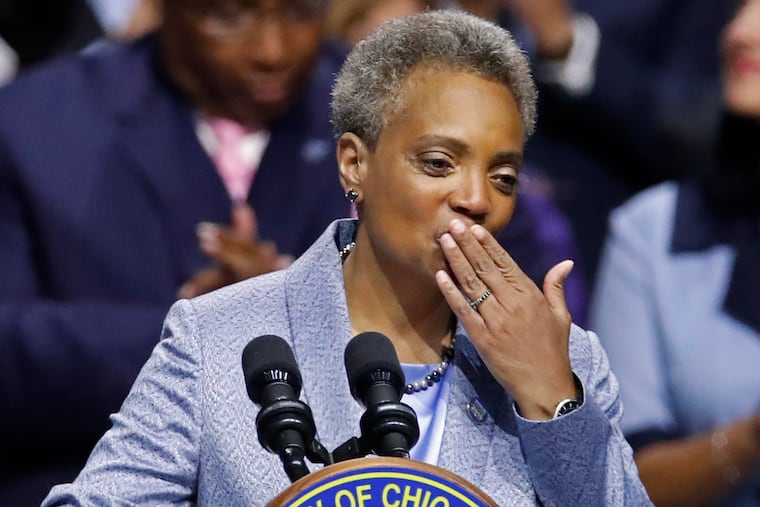Lightfoot promises ‘reform is here’ as she becomes Chicago’s mayor
Lori Lightfoot, who ran for Chicago's top job as a first-time reform candidate with few ties to the city's entrenched political structure, was sworn in as its 56th mayor Monday during a ceremony that noted her historic firsts.

CHICAGO — Lori Lightfoot, who ran for Chicago's top job as a first-time reform candidate with few ties to the city's entrenched political structure, was sworn in as its 56th mayor Monday during a ceremony that noted her historic firsts.
“For years they said, ‘Chicago ain’t ready for reform.’ Well, get ready, because reform is here,” Lightfoot said to cheers inside a packed Wintrust Arena. She was joined on a stage by such Illinois power brokers as U.S. Sens. Richard J. Durbin and Tammy Duckworth, Rep. Jesús “Chuy” Garcia, Gov. J.B. Pritzker, former Chicago Mayor Richard M. Daley, and outgoing Mayor Rahm Emanuel.
Lightfoot's half-hour speech was deeply personal and acknowledged that she is the city's first black female leader as well as its first openly gay one. The former federal prosecutor introduced her wife and 11-year-old daughter, then choked up when presenting her 90-year-old mother: "You and dad told me I could be anything that I wanted … My gratitude to you knows no limits."
She addressed the priority issues that had helped to propel her through a crowded, raucous campaign and runoff to Monday’s inauguration: violence, police reform, the ongoing exodus of black residents, and Chicago’s lack of affordable housing. She then laid out her plans to curb citywide cronyism and corruption.
"Stopping it isn't just in the city's interest, it's in the City Council's own interest," she said before turning around to face the 50 aldermen seated behind her. As the crowd rose to applaud, the aldermen slowly followed. Lightfoot then turned back to the lectern, nodding her head and smiling.
A flamenco band had performed as people streamed into the arena in the South Loop neighborhood in the early morning, hours before the 56-year-old Lightfoot took the stage. For many people, the occasion was especially noteworthy. Beyond her own history-making distinctions, Lightfoot is the first mayoral candidate in modern times to make ending corruption a priority. That message helped deliver her landslide victory in April.
"We're a city of the haves and have-nots, and Lori ran on leveling the playing field for all Chicago residents. I hope she restores hope. We need it," said Kim Holmes, who came with her husband.
Garcia, who ran for Chicago mayor four years ago, noted that Lightfoot is "facing multiple crises," including acute levels of gun violence and a $750 million budget deficit. "But the fact she won all 50 wards, in a city that has been historically polarizing, is transformative for this city. People want change."
Some parents brought their children, saying Lightfoot’s auspicious life story — of an outsider from a modest background working her way up to the mayor’s office — represents possibility. Kellie O’Connell wanted her 12-year-old daughter, Brennan, there because “it is important for her to see what she can be in the future.”
"It's aspirational for young people," said O'Connell. "It's also exciting to see how the mayor will bring a fresh perspective to a system that has had structural inequality built into it over decades."
Others arrived from out of state. Viola Mines, a 60-year-old autoworker in Detroit, flew to Chicago to witness an inauguration that she said has special meaning for the gay and lesbian community nationwide.
Lightfoot "has obviously reached across every culture in Chicago to get people to vote for her. That says something about how the world is changing in acceptance," Mines said. "Do they see a lesbian woman or someone who can do the job? This is a phenomenal day."
Immediately after the ceremony, Lightfoot traveled to city hall, where she signed an executive order to start the process to end aldermanic prerogative, a tradition that gives aldermen exclusive veto power in their ward over zoning, permitting and all other matters. Reform advocates have long said such absolute power is a conduit for corruption.
The signing, which was done publicly during a festive open house, follows other measures Lightfoot announced last week. They included appointing many of her liberal allies to key committee seats, displacing longtime chairs. Lightfoot also created a committee of ethics and good governance, responsible for pushing through many of her reform policies, and a committee on contracting oversight and equity to focus on city contracting with minority- and businesses owned by women.
The first City Council meeting that Lightfoot will preside over is scheduled for May 29.